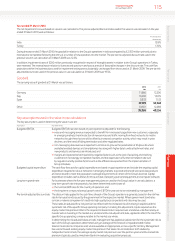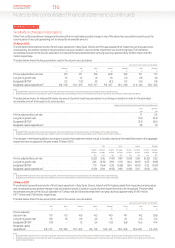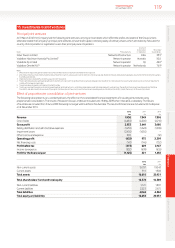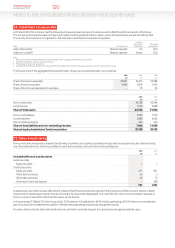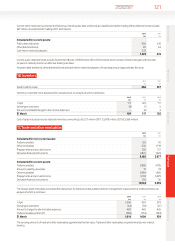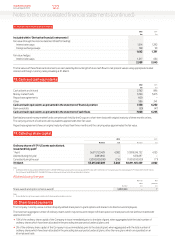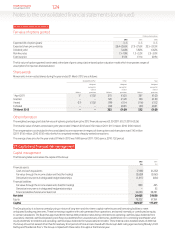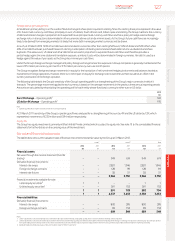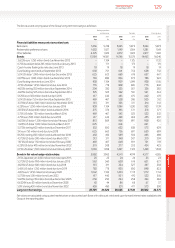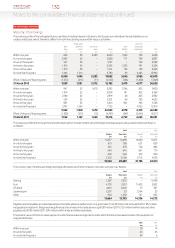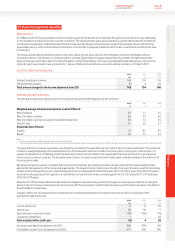Vodafone 2012 Annual Report Download - page 127
Download and view the complete annual report
Please find page 127 of the 2012 Vodafone annual report below. You can navigate through the pages in the report by either clicking on the pages listed below, or by using the keyword search tool below to find specific information within the annual report.
Business review Performance Governance Financials Additional information
125
Vodafone Group Plc
Annual Report 2012
Financial risk management
The Group’s treasury function provides a centralised service to the Group for funding, foreign exchange, interest rate management and counterparty
risk management.
Treasury operations are conducted within a framework of policies and guidelines authorised and reviewed by the Board, most recently on 27 March
2012. A treasury policy committee comprising of the Group’s Chief Financial Ofcer, Group General Counsel and Company Secretary, Group
Treasury Director and Director of Financial Reporting meets at least annually to review treasury activities and its members receive management
information relating to treasury activities on a quarterly basis. The Group’s accounting function, which does not report to the Group Treasury Director,
provides regular update reports of treasury activity to the Board. The Group’s internal auditor reviews the internal control environment regularly.
The Group uses a number of derivative instruments for currency and interest rate risk management purposes only that are transacted by specialist
treasury personnel. The Group mitigates banking sector credit risk by the use of collateral support agreements.
Credit risk
The Group considers its exposure to credit risk at 31 March to be as follows:
2012 2011
£m £m
Bank deposits 2,762 896
Repurchase agreements 600 –
Cash held in restricted deposits 333 338
Government bonds 900 610
Money market fund investments 3,190 5,015
Derivative nancial instruments 2,959 2,045
Other investments – debt and bonds 160 75
Trade receivables 4,005 4,277
Other receivables 3,219 3,325
Other 586 341
18,714 16,922
The Group invests in UK index linked government bonds on the basis that they generate a swap return in excess of £ LIBOR and are amongst the
most creditworthy of investments available.
Money market investments are in accordance with established internal treasury policies which dictate that an investment’s long-term credit rating is
no lower than mid BBB. Additionally, the Group invests in AAA unsecured money market mutual funds where the investment is limited to 7.5% of
each fund.
The Group has investments in repurchase agreements which are fully collateralised investments. The collateral is sovereign and supranational debt
of major AAA rated EU countries denominated in euros and US dollars and can be readily converted to cash. In the event of any default, ownership of
the collateral would revert to the Group. Detailed below is the value of the collateral held by the Group at 31 March 2012.
2012 2011
£m £m
Sovereign 575 –
Supranational 25 –
600 –
In respect of nancial instruments used by the Group’s treasury function, the aggregate credit risk the Group may have with one counterparty is
limited by (i) reference to the long-term credit ratings assigned for that counterparty by Moody’s, Fitch Ratings and Standard & Poor’s, (ii) that
counterparty’s ve year credit default swap (‘CDS’) spread, and (iii) the sovereign credit rating of that counterparty’s principal operating jurisdiction.
Furthermore, collateral support agreements were introduced from the fourth quarter of 2008. Under collateral support agreements the Group’s
exposure to a counterparty with whom a collateral support agreement is in place is reduced to the extent that the counterparty must post cash
collateral when there is value due to the Group under outstanding derivative contracts that exceeds a contractually agreed threshold amount.
When value is due to the counterparty the Group is required to post collateral on identical terms. Such cash collateral is adjusted daily as necessary.
In the event of any default ownership of the cash collateral would revert to the respective holder at that point. Detailed below is the value of the cash
collateral, which is reported within short-term borrowings, held by the Group at 31 March 2012:
2012 2011
£m £m
Cash collateral 980 531
The majority of the Group’s trade receivables are due for maturity within 90 days and largely comprise amounts receivable from consumers and
business customers. At 31 March 2012 £1,806million (2011: £2,233million) of trade receivables were not yet due for payment. Total trade
receivables consisted of £2,672million (2011: £2,852million) relating to the Europe region and £1,333million (2011: £1,425million) relating to the
Africa, Middle East and Asia Pacic region. Accounts are monitored by management and provisions for bad and doubtful debts raised where it is
deemedappropriate.


